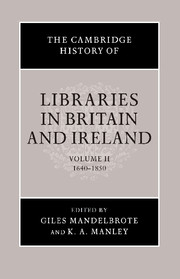Book contents
- Frontmatter
- 1 Introduction: the changing world of libraries – from cloister to hearth
- PART ONE THE EXPANSION OF BOOK COLLECTIONS 1640–1750
- PART TWO LIBRARY DEVELOPMENT AT A LOCAL LEVEL
- PART THREE PROVINCIAL AND METROPOLITAN LIBRARIES 1750–1850
- 18 Libraries in context: social, cultural and intellectual background
- 19 The book trade and libraries
- 20 Ecclesiastical libraries
- 21 Libraries in the parish
- 22 Books and universities
- 23 Libraries and literacy in popular education
- 24 Scientific and medical libraries: the rise of the institution
- 25 The first century of the British Museum library
- 26 The impact of the British Museum library
- 27 Private libraries in the age of bibliomania
- 28 Library architecture and interiors
- 29 Library management in the pre-professional age
- 30 Libraries for an imperial power
- 31 Engines of literature: libraries in an era of expansion and transition
- Select bibliography
- Index
- References
23 - Libraries and literacy in popular education
from PART THREE - PROVINCIAL AND METROPOLITAN LIBRARIES 1750–1850
Published online by Cambridge University Press: 28 March 2008
- Frontmatter
- 1 Introduction: the changing world of libraries – from cloister to hearth
- PART ONE THE EXPANSION OF BOOK COLLECTIONS 1640–1750
- PART TWO LIBRARY DEVELOPMENT AT A LOCAL LEVEL
- PART THREE PROVINCIAL AND METROPOLITAN LIBRARIES 1750–1850
- 18 Libraries in context: social, cultural and intellectual background
- 19 The book trade and libraries
- 20 Ecclesiastical libraries
- 21 Libraries in the parish
- 22 Books and universities
- 23 Libraries and literacy in popular education
- 24 Scientific and medical libraries: the rise of the institution
- 25 The first century of the British Museum library
- 26 The impact of the British Museum library
- 27 Private libraries in the age of bibliomania
- 28 Library architecture and interiors
- 29 Library management in the pre-professional age
- 30 Libraries for an imperial power
- 31 Engines of literature: libraries in an era of expansion and transition
- Select bibliography
- Index
- References
Summary
In 1750 Britain was still predominantly rural, with the majority of the population living in the countryside. By 1850, although the rural population still accounted for nearly half of the total, the remainder were concentrated into towns. In parallel with this mass migration, new political ideas spread widely. The French Revolution inspired the growth of Radicalism, and although middle-class reformers were far from revolutionary in their social ideas, there was also a developing working-class movement for more drastic reforms. By 1850 reforms in areas such as public health, housing, sanitation, and the prevention of crime and disorder had begun to have an effect, but the new industrial society still faced massive social and political problems.
It is against this background that the history of popular education, with its attendant libraries, has to be seen. In 1750, the mass of the population had to make do with an assortment of schools of highly variable quality. For those who could afford it, there were a number of grammar schools, and a growing number of private schools or ‘academies’, but the poorest members of society had institutions offering only elementary education, including charity schools, ‘free’ schools, parish schools, and above all privately run schools (including the so-called ‘dame schools’) patronised by some 70 per cent of the 250, 000 children at school in England in 1750. Few of the schools available to the masses offered completely free schooling, attendance was in no way compulsory, and in many cases the standard of teaching was low. Many poor children attended school for only a year or two, if at all, and at best could expect to achieve little more than the three Rs.
- Type
- Chapter
- Information
- The Cambridge History of Libraries in Britain and Ireland , pp. 371 - 387Publisher: Cambridge University PressPrint publication year: 2006



